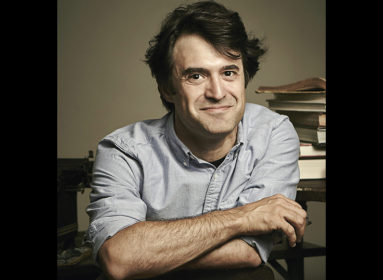
European antisemitism is going from bad to worse…with no end in sight, says head of AJC
By Cindy Mindell
Since 1990, the American Jewish Committee (AJC) – the Jewish advocacy organization with offices around the world – has been led by executive director David Harris.
Hailed as the “foreign minister of the Jewish people” by Israeli president Shimon Peres, Harris first joined the AJC staff in 1979, leaving the organization in 1981 to work for the National Conference on Soviet Jewry. He returned to the AJC in 1984 and became head of its Washington, D.C. office in 1987.
Harris will present “Anti-Semitism in Europe Today,” the annual Carl & Dorothy Bennett Lecture in Judaic Studies at Fairfield University on Tuesday, March 17.
Harris was centrally involved in the emigration of more than one million Jews from the Soviet Union and was described by The Washington Post as “one of the leading spokesmen” for the Soviet Jewry movement. In the course of that work, he was twice detained by Soviet authorities and once expelled from the country. He was asked by the organized American Jewish community to serve as the national coordinator for the historic Freedom Sunday for Soviet Jews, the 1987 demonstration in Washington that drew more than 250,000 participants. Harris also played a behind-the-scenes role in the rescue of the Ethiopian Jewish community in the early 1980s, before the historic Operation Moses of 1984-85.
Harris has been invited to speak at some of the world’s most prestigious forums, including the World Economic Forum in Davos, Switzerland, and has testified before the U.S. Congress, the UN Human Rights Commission, and the French Parliament. He has been honored a total of 14 times by governments from around the world for his international efforts in defense of human rights, advancement of the transatlantic partnership, and dedication to the Jewish people. He is also a member of the Council on Foreign Relations.
The author of seven books – Entering a New Culture (1989), The Jewish World (1994), and five volumes of In the Trenches: Selected Speeches and Writings of an American Jewish Activist (2000-06) – and co-author of The Jokes of Oppression: The Humor of Soviet Jews (1995), Harris has also written hundreds of articles, op-eds, letters, and reviews in leading newspapers and magazines – since he also holds a weekly spot on the CBS Radio Network and is a regular contributor to The Huffington Post, The Jerusalem Post, El País in Spain, and L’Opinione in Italy.
Harris gave the Ledger a preview of his upcoming lecture.
Q: Briefly, how would you describe the level, nature, and manifestation of antisemitism in Europe today?
A: It’s serious and likely, I fear, to get only more so. There are three main sources. The first is the far right, which has been growing in some countries as a response to the economic malaise and to the increasing number of immigrants, which prompts the belief that the character of the country is changing, fosters seething anger, and seeks convenient scapegoats. The second is the widespread industry of denying Israel its very right to exist, much less to defend itself. Thus, if Israel is an “illegitimate” nation, then those who support it among Europe’s Jews are themselves “worthy” targets. And third, there are elements within the rapidly growing Muslim population that bring with them deeply-rooted antisemitism from their native lands, absorb it in Europe via social media, radical teachings, etc., or carry it back from the Middle East, where they have gone as “foreign fighters.”
Q: Diaspora Jews have always had to assess antisemitic threats on a scale of innocuous to “pack your bags.” How does AJC make these assessments and where on the scale do you see European Jewish communities today?
A: AJC works very closely with many European Jewish communities and also maintains offices in four major European cities – Berlin, Brussels, Paris, and Rome. We also meet regularly with Europe’s political and civic leaders. All of this gives us a pretty good handle on the evolving situation. Indeed, we began calling attention to the growing problem as early as 2000, when, believe me, most European officials refused to open their eyes and see what was going on. It’s nothing short of a tragedy that so many years and so many attacks had to happen before a new reality set in. Today, I’d like to acknowledge in particular German Chancellor Angela Merkel and French Prime Minister Manuel Valls for their strong, principled leadership.
Q: The response to antisemitic attacks in several European cities has been to post armed guards at Jewish institutions. Do you see this as a permanent measure? What are the next steps?
A: Yes, the need for it is likely to be permanent, at least for the foreseeable future, I’m sorry to say. It must be coupled with other measures, ranging from increased intelligence and monitoring and strengthened hate-crimes laws to longer-term actions in the fields of education and civil society. But it begins with a recognition that there is a specific danger for Jews and Jewish institutions, and that the threat resides principally within jihadist elements in Europe. As obvious as that may seem, especially after the attacks in Toulouse, Paris, Brussels, Copenhagen, and elsewhere,
tragically, some, for reasons best known to them, refuse to see the obvious, much less identify it by its proper name. All that said, longer-term, it would be a tragedy if Jewish children had to run a daily gauntlet of armed soldiers on their way in and out of school, as these youngsters learned early on that there are those ready to harm Jews for the simple reason that they are Jews.
Q: In the wake of the Paris massacre in January, Prime Minister Netanyahu’s public call for European Jews to make aliyah has been the subject of debate. What is AJC’s take on Netanyahu’s call?
A: Europe’s Jews are smart, savvy, and sophisticated. Each individual or family will make its own decision about the future. I doubt they’ll be convinced by what others have to say, be it the Israeli government calling for aliyah or European political leaders urging them to stay put. For AJC, we will support the decision of those who wish to leave, and we will stand by those who want to stay. Both groups are entitled to determine their own destiny, of course, and both deserve our full solidarity.
Q: What is AJC’s call to action for American Jews vis a vis antisemitism in Europe?
A: First, American Jews need to understand that the threats are real. For some European Jews, such decisions as to whether to send children to a Jewish school, or go to a synagogue, or visit a kosher store, or attend a Jewish event now entail all kinds of calculations about safety and security. Second, not all European countries are identical. Some face greater danger than others. Third, most European countries today have taken a strong position against antisemitism, even if they have not necessarily found the strategies for marginalizing it. Fourth, unlike the 1930s, Israel exists and represents a potential home and haven for those wishing to leave. Fifth, American Jews can count on our government and Congress to stand with us in helping to address the problem, which is increasingly global in nature. And sixth, visit our website at ajc.org, join us, and help fight the good fight. This is a defining moment for the Jewish people. Let’s each and every one of us say “Hineini,” “Here I am.”
David Harris will speak on Tuesday, March 17, 7:30 p.m. at Fairfield University, Regina A. Quick Center for the Arts, 1073 North Benson Road, Fairfield. Admission is free, but reservations are required. Call (203) 254-4000, ext. 2066.








 Southern New England Jewish Ledger
Southern New England Jewish Ledger








